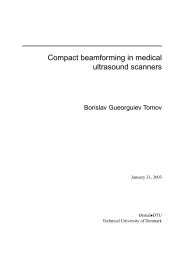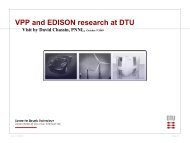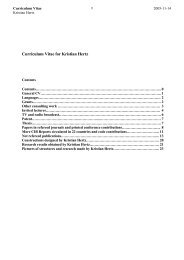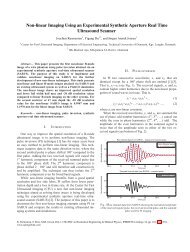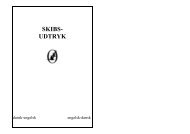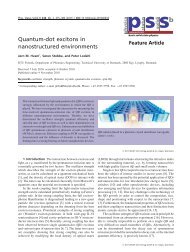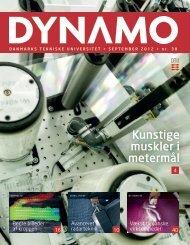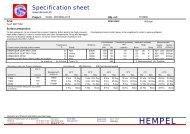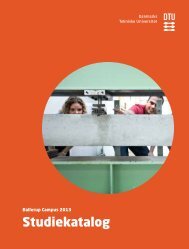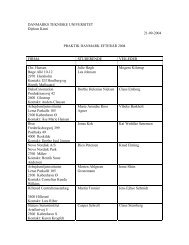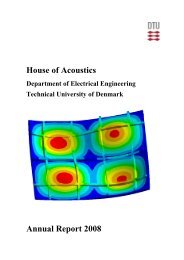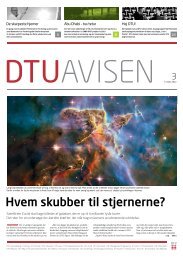Role of Intestinal Microbiota in Ulcerative Colitis
Role of Intestinal Microbiota in Ulcerative Colitis
Role of Intestinal Microbiota in Ulcerative Colitis
Create successful ePaper yourself
Turn your PDF publications into a flip-book with our unique Google optimized e-Paper software.
7. Discussion and perspectives<br />
Discussion and conclusion<br />
159<br />
7. Discussion and perspectives<br />
7.1. Compositional changes <strong>of</strong> the fecal microbiota and their capacity to<br />
colonize mucus<br />
The commensal bacteria found <strong>in</strong> the human gut are important for host health, and ma<strong>in</strong>tenance<br />
<strong>of</strong> tolerance toward the <strong>in</strong>test<strong>in</strong>al bacteria by the host is critical to preserve this health. It is<br />
believed that the <strong>in</strong>teraction between host and commensal bacteria is disturbed <strong>in</strong> UC and this<br />
may have a consequence for the microbiota composition <strong>of</strong> the gut (Sartor, 2006). Several studies<br />
have previously exam<strong>in</strong>ed the microbial composition <strong>in</strong> UC patients and found that it differs from<br />
that <strong>of</strong> healthy subjects (Ott et al., 2004;Mylonaki et al., 2005;Frank et al., 2007;Takaishi et al.,<br />
2008;Sokol et al., 2009;Q<strong>in</strong> et al., 2010). Among these studies, only a few have used samples from<br />
both UC patients <strong>in</strong> remission and relapse for comparison (Mylonaki et al., 2005;Takaishi et al.,<br />
2008;Sokol et al., 2009).<br />
In Paper 1, fecal samples from UC patients <strong>in</strong> remission or relapse, and healthy subjects were<br />
analyzed by PCR‐DGGE f<strong>in</strong>gerpr<strong>in</strong>t and qPCR based pr<strong>in</strong>cipal component analysis (PCA). The results<br />
revealed that UC patients <strong>in</strong> relapse appeared to have a different fecal microbiota than healthy<br />
subjects and this difference could be ascribed to the Gram‐negative bacteria. A potent stimulator<br />
<strong>of</strong> <strong>in</strong>flammation from Gram‐negative bacteria is LPS, hence an altered composition <strong>of</strong> Gram‐<br />
negative bacteria could add to abnormal LPS signal<strong>in</strong>g enhanc<strong>in</strong>g mucosal <strong>in</strong>flammation <strong>in</strong> UC.<br />
Add<strong>in</strong>g to this, the overall bacterial changes observed <strong>in</strong> UC patients <strong>in</strong> relapse described both <strong>in</strong><br />
Paper 1 and <strong>in</strong> literature (Mylonaki et al., 2005;Takaishi et al., 2008;Sokol et al., 2009) could<br />
further promote <strong>in</strong>test<strong>in</strong>al <strong>in</strong>flammation, s<strong>in</strong>ce the changed composition <strong>of</strong> commensal bacteria<br />
may be unable to sufficiently <strong>in</strong>duce regulatory immune responses, hence <strong>in</strong>capable <strong>of</strong><br />
term<strong>in</strong>at<strong>in</strong>g <strong>in</strong>flammation (Geuk<strong>in</strong>g et al., 2011). It should however be noted that the bacterial<br />
changes could be a consequence <strong>of</strong> <strong>in</strong>test<strong>in</strong>al <strong>in</strong>flammation and not the cause, due to hyper‐<br />
responsiveness <strong>of</strong> the mucosal immune system towards commensals through mutations and/or<br />
over‐expression <strong>of</strong> TLRs (De Jager et al., 2007;Frolova et al., 2008;Fuse et al., 2010).<br />
The results from Paper 1 also revealed that some samples from patients <strong>in</strong> remission resembled<br />
those <strong>of</strong> patients <strong>in</strong> relapse, while others resembled those <strong>of</strong> healthy subjects <strong>in</strong>dicat<strong>in</strong>g that the<br />
level <strong>of</strong> some bacterial groups derived from UC patients <strong>in</strong> remission is similar to healthy subjects,<br />
while others is similar to UC patients <strong>in</strong> relapse. This is <strong>in</strong> accordance with previous



